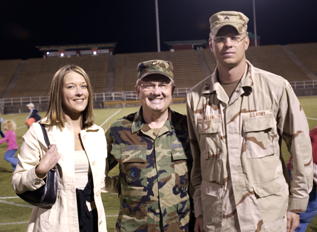 |
Sgt. Chad Miller, far right, at a November homecoming ceremony in Lincoln with wife, Steph, and Maj. Gen. Roger Lempke, adjutant general of Nebraska. |
It is the UNMC College of Nursing student and Nebraska Army National Guard medic’s first Memorial Day back on American soil after serving a year in Iraq.
“The experience in Iraq definitely puts things in perspective,” Miller said. “A lot of trivial things I stressed over before I deployed I probably won’t stress over now. It definitely gives you a respect for life because I saw a lot of lives lost.”
The Grant, Neb., native was more than halfway through a semester when he was told he was going to Iraq to provide medical support for convoys. He was deployed in October 2004. On July 1, 2005, UNMC Today published e-mailed excerpts of Miller’s experiences in Iraq.
Now, back in nursing school, the knowledge and skills Miller learned in Iraq will help him, just as the skills he learned in nursing school helped him during his deployment.
“I enjoyed emergency medical care (over there),” Miller said. “It solidified which direction I want to go.”
Miller, who was married in April, returned to his studies on the Omaha campus earlier this year. He plans to go to graduate school to become a nurse practitioner or nurse anesthetist.
After training for months in Fort Riley, Kan., the 77-member Nebraska unit, made up mostly of medics, headed to Iraq to provide medical support for convoys. Their route — from near Fallujah to the Jordanian border in Al Asad – was one of the largest and most dangerous routes.
There, Miller performed routine and emergency care — everything from cuts and punctured lungs to severe head trauma and cricothyroidotomies, an emergency surgery similar to a tracheotomy.
The ability to keep in touch with family and friends during deployment, including individuals in the UNMC College of Nursing, was helpful.
Among those he communicated with was Larry Hewitt, director of student services in the UNMC College of Nursing and a Vietnam veteran. “Thirty years ago, I was deployed overseas as a medic and I remember how great it was to hear from people,” said Hewitt, who attended the welcome home ceremony in Lincoln for Miller and his company.
“During the Vietnam era, many men and women returned home to a not-so-happy reunion,” Hewitt said. “Being a member of the military during this time I knew many vets who experienced a sad return after serving their country. I felt it was important for me to stand up and remember what it means to be an American and a veteran and share with today’s troops the appreciation we have for them and the job they had to do.”
Miller said it meant a lot to see Hewitt at last November’s ceremony.
“He was probably one of the first faces I saw. Right as I walked up to the homecoming ceremony, I met with Larry. That meant a lot. He knew … we didn’t even have to talk ’cause he’s been there. Having Larry here in the college has been awesome.”
Miller said he was “fairly lucky” in his convoy excursions up until his eighth month of deployment. Until then, “none of the explosions we’d experienced had been very close to me,” he said.
Then just before he went on R&R (rest and relaxation), fellow medic and Nebraskan Sgt. Trisha Jameson of Lincoln was killed in an ambush and Spec. Rochelle Spors was seriously injured.
“Up to that point, vehicles were being hit all the time.but an ambulance had never been hit and one of our own had never been hit,” he said. “Once we saw it could have been one of us, it made it more of a reality.”
Miller said it could easily have been him instead of Jameson.
“Sgt. Jameson and Spec. Spors had replaced us,” he said. “We would have been in the same position. We were doing the same exact mission.”
Miller said the enemy had been scouting his unit when, on two consecutive days, they were called out to treat a Marine convoy that had been hit. He and his colleague then switched with Jameson and Spors. When Marines came under attack in the same location, Jameson and Spors responded in an ambulance with Marine escorts.
That’s when they came under attack.
“I had some guilt for a while thinking maybe I would have done things differently had I been out there, but then.I realized we would have done the same thing had we been in their situation.”
Things got worse after he returned from R&R.
“My vehicle got hit twice,” he said. “Others lost their hearing, but I had my earplugs in.” His convoy — which could number 90 to 120 vehicles — also lost four civilian contract employees — many of whom were from Jordan, Kuwait, Turkey and Saudi Arabia.
“We lost numerous civilians,” he said. “Their vehicles aren’t armored at all.”
Miller also battled sleep deprivation, insomnia and exhaustion. The duration of a convoy ranged from seven to 30 hours one-way. Once the unit reached its destination, they would rest six hours then drive back. Upon reaching base camp, they’d get a 24-hour reprieve before hitting the road again.
“It was stressful because something could happen at any moment,” said Miller, who traveled almost 25,000 miles while in Iraq. “We were on the road almost constantly.”
Overall, though, his experience in Iraq was a good one. “I liked the medical experience and I liked my job,” he said. “If I didn’t have people I love back here, I’d probably go back and do it again.”